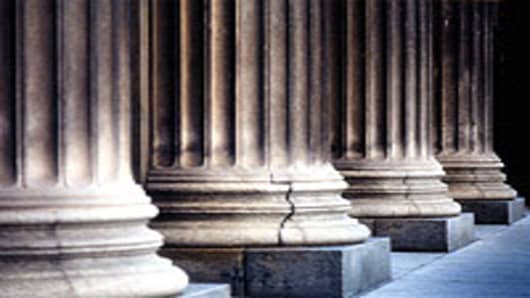If banks such as Barclays had not tried to manipulate lending rates during the 2008 financial crisis, the panic around the financial system might have been worse.
That, at least, is the thinking behind those who believe the scandal behind crisis-era rates for Libor — the London Interbank Offered Rate—probably won't produce criminal prosecutions.
Those on the other side of the argument, though, say the Libor scandal is a big deal and the factors that led to it still haven't been addressed.
Dick Bove, the widely followed banking analyst at Rochdale Securities, is one who believes that while there is plenty of evidence to suggest that Barclaysand others lied about rates, and that regulators even were aware that it was going on, the regulators probably acted properly in not making more of it at the time.
Bove acknowledged holding what "may be a contradictory stance," but he is sticking to it.
"It will be recalled that the regulators were dealing with a significant financial crisis. To stem the panic, they lowered interest rates, invested in banks, loaned trillions of dollars to these institutions and guaranteed trillions more in bank liabilities," he said in an analysis for clients.
"If the dollar Libor rate had risen sharply in this period all of this activity would not have succeeded."
Setting Libor is a complicated process, and the role it played in the financial crisis is no less so.
Libor is set each night when leading banks estimate the rates they would be charged when borrowing from each other. The concept is important because it reflects the risk that each institution applies to its financial position. Overnight borrowing is a key part of the large banks' business models to fund operations.
Barclays admitted to fudging its Libor numbers during the crisis because, according to transcripts the Federal Reserve released last week, it feared that a true rate reflecting its credit risk might cause concern among investors and impact its stock price.
Bove said an artificially low Libor also may have helped prevent further global tumult "because it is the dollar Libor rate, and not the Federal Funds rate, that is used to determine the interest rates charged on the bulk of the loans in the United States, and financial securities around the globe.
"If this rate had jumped precipitously in late 2008, the 'tax' on the United States economy would have been enormous. Households and businesses would have been forced to increase their payments on virtually all of their debt by very sizable amounts."
But was it really a case of no harm-no foul?
Kevin Ferry, who runs Cronus Futures Management in Chicago, doesn't think so.
"They'll sat it's counterfactual, but it's the core of the argument. They're trying to get PR language out there saying the rates were down, so who was hurt by it?," Ferry says. Answering the question, he offers: "Anyone who was anticipating higher rates."
That's no small consideration, with hundreds of trillions, notionally, in derivatives floating around the marketplace and dependent on accurate rate-setting.
From traders in the futures pits to governments hedging against their credit exposure, there were plenty of victims of Libor cheatingwho no doubt would like to see someone get some comeuppance. (For the record, Ferry had taken out futures contracts anticipating lower rates, so he was not individually harmed.)
Lots of traders try to make money off the rate differences, particularly the "Ted Spread," which is the difference between three-month Treasury yields and eurodollar contracts of the same expiration. Wider spreads indicate greater financial stress.
"The Fed harmed you because their facilities, policies and public statements were designed to drive that spread in on you," Ferry says. "You're materially harmed if you're long the Ted."
Like many others, Ferry says Libor manipulation was an open secret at the time, and talk of investigations has been around the markets for years. Regulators at the New York Federal Reserve, headed then by current Treasury Secretary Timothy Geithner, have said they were on top of the matter during the crisis.
Geithner reiterated as much during the "Delivering Alpha" conference presented Wednesday by CNBC and Institutional Investor magazine.
"I know they were on top of it because I was talking to people during the crisis. 'We know this, Kevin,' is what they said," Ferry says. He adds: "As those spreads move out, the ability of the system to fund itself becomes more expensive. It seizes up. So there's no conspiracy in the Treasury Department or the Fed to do what they did. They wanted that to happen."
The one point that both sides in the discussion agree on is that the system needs to be changed, which may be the one great result of the scandal.
"They wonder why the economy doesn't come back, they wonder why the financial system isn't doing anything," Ferry says. "It's the Karen Ann Quinlan of financial systems. It's being kept alive while they develop the processes that will constitute the new financial system. They don't want banks to fund themselves this way anymore."
Bove objects to the near-exclusion of U.S. banks in setting the lending rate, with only three American institutions among the 18 surveyed.
"It should be controlled by Americans, and it should be flexible enough to allow central bankers to intervene in times of crisis," he says. "These are the issues that should be under discussion now, not baiting the banks one more time. It is time that this society realizes that it must understand the banking industry and how it interacts with the economy rather than dissolving into meaningless hyperbole again."
Questions? Comments? Email us at NetNet@cnbc.com
Follow Jeff @ twitter.com/JeffCoxCNBCcom
Follow NetNet on Twitter @ twitter.com/CNBCnetnet
Facebook us @ www.facebook.com/NetNetCNBC




